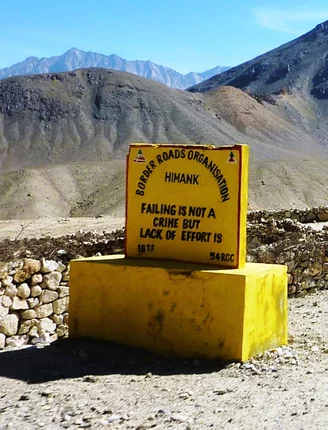We are all agreed that your theory is crazy. The question that divides us is whether it is crazy enough to have a chance of being correct.
— Niels Bohr to Wolfgang Pauli, after Pauli presented his “non-linear field theory”
###
If my life is judged by my mistakes, I’m basically one big failure! Money, parenting, choice of profession, compassion for others (and self), sexuality, countless missed opportunities … years littered with one mistake after another. Which should, if emotions have anything to do with it, leave me in a state of guilt and regret. Instead, I have to remind myself: of course I made mistakes and of course I beat myself up for them — this is life we’re talking about. How else do we learn if not by (a) making mistakes, (b) feeling bad about them, leading to (c) doing something different next time.

On the Leh-Nubra road, Ladakh. John Hill, CC BY-SA 4.0, via Wikimedia Commons.
I think I first came to grips with this obviousness — not only are mistakes okay, but they’re essential if we’re do do anything other than hibernate our lives away in a cocoon — many years ago, reading wise old Tom Robbins’ sweet, hippy novel about Sissy (of the enormous thumbs), Even Cowgirls Get the Blues:
So you think that you’re a failure, do ya? Well, you probably are. What’s wrong with that? In the first place, if you have any sense at all, we pay just as dearly for our triumphs as we do for our defeats. Go ahead and fail! But fail with wit, fail with grace, fail with style. A mediocre failure is as insufferable as a mediocre success. Embrace failure! Seek it out. Learn to love it. That may be the only way any of us will ever be free.
Evolutionarily speaking (and I trust the unsupported conjectures of evolutionary philosophy), it makes sense that we feel bad, sometimes literally, about the mistakes we make. Eat poisonous fruit and you get sick; if you recover, you learn not to eat that particular fruit again. What doesn’t kill you makes you strong.
This ramble was prompted by a recent outcry about a theory of consciousness known as Integrated Information Theory. IIT is, to be brutal, as nutty as every other theory of consciousness. I’m a “mysterian,” that is, I doubt we’ll ever truly understand consciousness, there being no way to inspect our brains from the outside. The outcry was in the form of a letter, signed by 124 researchers, which claimed IIT was pseudoscience — which it probably is, being untestable, like the existence of God or that we’re in a simulation. Which, per se, doesn’t make it wrong. What caught my eye was a rebuttal to the criticism by a neuroscientist, Erik Hoel, who feared that the letter would discourage young researchers from dabbling in wild and outrageous theories. “The most important thing for me is that we don’t make our hypotheses small and banal in order to avoid being tarred with the pseudoscience label,” he wrote.
In other words, think big and embrace your failures.
CLICK TO MANAGE